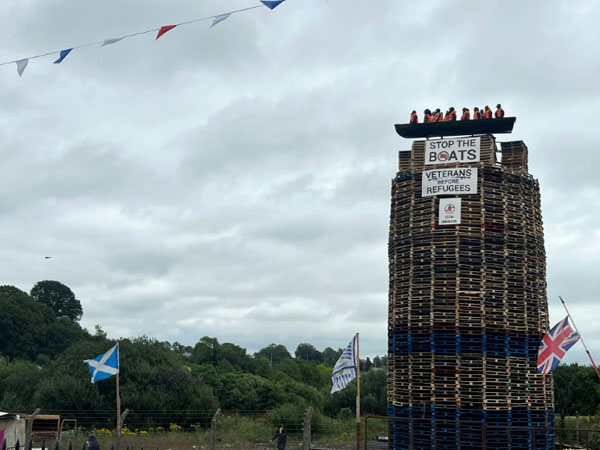A Burning Symbol of Division and Hatred
In a small village in Northern Ireland, an effigy representing migrants wearing life jackets and their boat was set ablaze in a massive bonfire. This event, occurring during the annual July 12 celebrations, highlights the deep-seated sectarian tensions that continue to shape the region. The bonfire, part of a long-standing tradition, has taken on new meaning as it now includes elements of anti-immigrant sentiment.
The effigy, which was placed atop a towering stack of wooden pallets, drew significant attention due to its message. It bore a sign that read “Veterans before refugees,” a phrase that sparked controversy among local residents. Despite the backlash, the organizers remained firm in their stance, emphasizing their right to express their views through this traditional practice.
This incident is not isolated. In recent years, there have been increasing reports of anti-immigrant attacks and unrest in various parts of Northern Ireland. These events often occur in loyalist areas, where historical grievances and current political tensions intersect. Experts suggest that the persistence of these issues is closely tied to the legacy of the past, particularly the dominance of Protestant loyalists in the region.
Historical Context and Changing Dynamics
Northern Ireland’s history is marked by a complex interplay of religious and political divisions. The July 12 celebrations, which commemorate the victory of Protestant king William of Orange over his Catholic rival in 1690, have long been a source of contention. While these events are celebrated by many Protestants, they are viewed by some Catholics as provocative and inflammatory.
Dominic Bryan, an anthropology professor at Queen’s University Belfast, notes that loyalists once held significant power in the region. However, the dynamics have shifted over time, leading to a more diverse and complex social landscape. This change has not eliminated the underlying tensions but has instead transformed them into new forms of conflict.
The Role of Right-Wing Ideologies
The recent bonfire event also reflects the influence of right-wing ideologies in Northern Ireland. Researchers have observed fundamental shifts in the power traditionally held by pro-UK Protestant loyalists. These groups have increasingly adopted stances similar to those seen in other parts of Europe, including anti-immigrant rhetoric.
The presence of the Irish flag atop the bonfire further underscores the complexity of the situation. While the flag is a symbol of Irish nationalism, its placement in a loyalist context raises questions about identity and belonging. This duality highlights the ongoing struggle between different communities in Northern Ireland.
Community Responses and Defiance
Despite the controversy surrounding the migrant effigy, the organizers remained defiant. A community representative, speaking in a video published by Turning Point UK, emphasized their commitment to the tradition. “Wherever we have to place a bonfire, we will,” he stated, highlighting the importance of preserving their cultural heritage.
This defiance is not without consequences. The recent incidents of violence in Ballymena and Belfast serve as a reminder of the potential for conflict when tensions are left unchecked. Experts warn that the intertwining of sectarian divides and anti-immigrant sentiments can lead to further unrest if not addressed.
Moving Forward
As Northern Ireland continues to navigate its complex social and political landscape, the need for dialogue and understanding becomes increasingly important. The events surrounding the bonfire and the migrant effigy illustrate the challenges faced by communities striving to coexist peacefully. Addressing these issues requires a concerted effort from all sides to foster inclusivity and respect.
In conclusion, the burning of the migrant effigy in Northern Ireland is more than just a symbolic act. It represents the broader struggles and tensions that continue to shape the region. As society evolves, so too must the approaches to addressing these deep-rooted issues, ensuring a future built on mutual respect and understanding.







